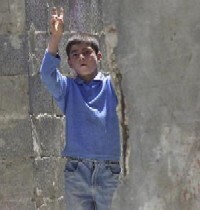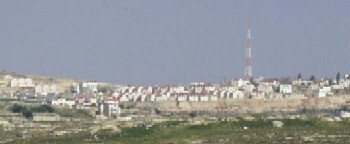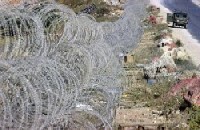Do you remember when you went to Nablus passing the Israeli colony of Beit El? Do you remember the fence that goes along the colony but makes a sharp U-turn around this Palestinian home? Let me tell you the story of Abu Salam.

AP Photo/Karel Prinsloo
One day, the three families (Salam, Peace and Shalom) met on a wall in Jerusalem and adopted an emblem, it was a white dove.
Abu Salam lives in an old house adjascent to some modern houses with red roofs built on a mountain named Bet El. A fence that prevents any living creature to reach beyond it protected the houses. Abu Salam’s home was very close to the fence. The history of Bet El goes back in time when a man who was searching for a wife fell a sleep there and dreamt of angels going up and down a ladder in the sky, so he decided to call the place ‘Bet El’, which means in Hebrew, ‘the House of God’.

photo: ARIJ
Abu Salam was shocked when he heard his new neighbors talking since they spoke a language that Abu Salam could not understand. However, when the people were talking, Abu Salam heard the word ‘Shalom’, so he said to himself ‘those are my family, I must talk to them, the fortuneteller was right.

AP Photo/Enric Marti
Suddenly, the ‘Peace’ family passed by; they heard the infertile talks between Abu Salam and his Shalom neighbors who were standing behind the strong fence. ‘Peace’ managed somehow to walk through the fence and met Abu Salam’s neighbors, as for Abu Salam, all his attempts to make it beyond the fence were in vain.
One day, a handsome poet emerged before Abu Salam and uttered forth the following words:
You will be looking for it, son,
You will ask the waves and the seaweed about it,
And you will sail across many seas searching for it.
Your tears will run like rivers,
But when your life is almost over,
You will realize that you were chasing a shadow.
The poet is Nizar Qabani, a well-known Syrian poet. The lines were taken and translated from his famous poem ‘Kari’at Al Finjan’ i.e. the lady who reads the coffee cups or the fortuneteller.
The first picture shows a Palestinian kid in Dheishe refugee camp while Israeli occupation forces surround the camp (AP Photo/Karel Prinsloo), the second picture shows the Israeli colony of Beit El (photo: ARIJ) and the third picture shows an Israeli military jeep along the barbed wire fence, near Qalandia checkpoint, that separates Ramallah from the southern parts of the Occupied Palestinian Territories (AP Photo/Enric Marti).


